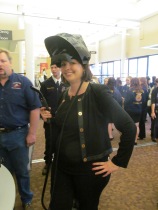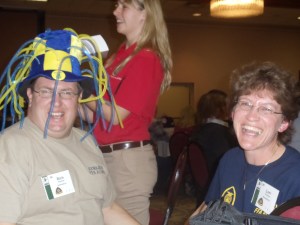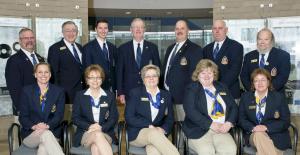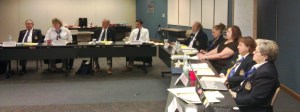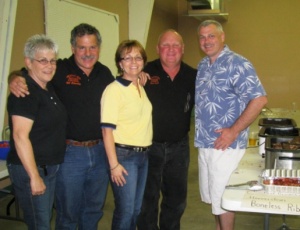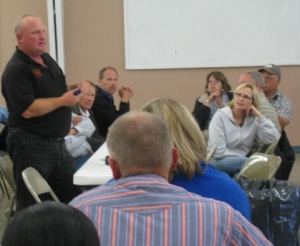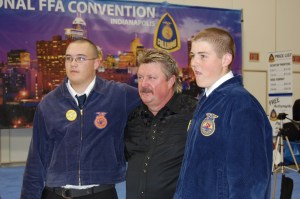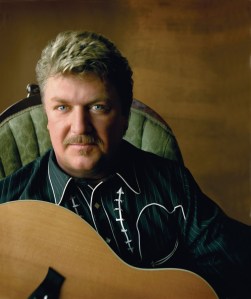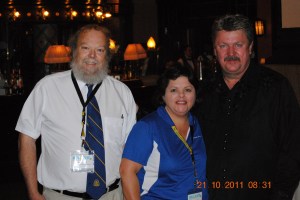The last time I was in Indianapolis was the summer of 2003. I remember it pretty well because I was still sulking about The Colts being moved there without my permission and not quite over their inglorious departure from my hometown of Baltimore twenty years earlier. My bitterness melted away however in nearby Plainfield at The National Chimney Sweep Training School, the site of my very first Dirty Job. There, I was instructed in the fine art of “flue maintenance,” and engulfed in flames while attempting to extinguish a raging creosote fire from the top of a rickety demonstration platform. Things went downhill after that and by the time I finally left town I was unrecognizable, concealed under a thick layer of ash and soot, with no plans of ever returning to The Crossroads of America.
Of course, in those days I was unrecognizable on a daily basis. Dirty Job s would not debut for another six months, and I had no reason to think that anyone would watch when it did. I was wrong about that, and I’ve been wrong about a great many things ever since. A few years ago in fact – proving once again that my plans and my life have little in common – I returned to Indianapolis a lot cleaner, and a lot less anonymous, to deliver the keynote address at The 82nd National Convention of The Future Farmers of America (10/21/09).
s would not debut for another six months, and I had no reason to think that anyone would watch when it did. I was wrong about that, and I’ve been wrong about a great many things ever since. A few years ago in fact – proving once again that my plans and my life have little in common – I returned to Indianapolis a lot cleaner, and a lot less anonymous, to deliver the keynote address at The 82nd National Convention of The Future Farmers of America (10/21/09).
For those of you who don’t know, The FFA is an organization of 500,000 teenagers, most of who look like they fell off the front of a Wheaties box. Wholesome, polite, and impossibly well mannered, these are the kids you wish you had, diligently pursuing an adolescence of agricultural acumen. Unfortunately, I arrived at their annual convention with the same level of planning and forethought I brought on my last visit, (i.e., none,) and found myself pacing in the wings twenty minutes before my appearance, trying to arrange my thoughts into an “inspirational and G-Rated message.” Luckily, I happened to glance down at the “FFA Briefing Packet,” recently handed to me by one of the organizers, and found some inspiration on page 4. 
“The FFA currently faces an image and perception problem. The previous name of the organization, “Future Farmers of America,” lends itself to stereotyping by the public. The FFA faces a continuing battle to redefine itself against narrow perceptions of “agriculture,” “vocational” and “farmers.” The name “FFA” is now used instead of “Future Farmers of America.”
Incredible. Have we really become so disconnected from our food that farmers no longer wish to be called farmers? Apparently, yes. The FFA has determined that most Americans think of farmers like those actors in Colonial Williamsburg – smiling caricatures from Hee Haw and Green Acres, laboring quaintly in flannel and denim. From what I’ve seen, they’re right. Over and over I hear the same thing from farmers I’ve met on Dirty Jobs. Technical advances in modern agriculture now rival those of 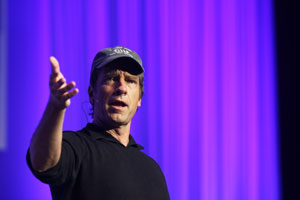 Silicon Valley, and today’s farms are more efficient than ever, but no one seems to have gotten the memo. No one seems to care.
Silicon Valley, and today’s farms are more efficient than ever, but no one seems to have gotten the memo. No one seems to care.
The question is “why?” and fifteen minutes later I was on stage, trying to provide a sensible answer to an audience of 55,000 future farmers who preferred to be called something else. I talked about the power of labeling and the dangers of typecasting, from Hollywood to Iowa. I relied upon my own mistakes and misperceptions to make my points, (no shortage there,) and told some stories about the education I’ve received in the course of shooting Dirty Jobs. I don’t know that  I was “inspirational” per se, but at the conclusion I was presented with some lovely parting gifts, and left the stage to thunderous applause. In short, I had a blast, and think the kids did as well.
I was “inspirational” per se, but at the conclusion I was presented with some lovely parting gifts, and left the stage to thunderous applause. In short, I had a blast, and think the kids did as well.
Later that night though, I discovered that there had also been some grown-ups in attendance. Some very serious grown-ups who run the kinds of organizations that actually put the food on our plates. People like Chad Gregory. Chad’s a big shot with The United Egg Producers, and claimed to have enjoyed my comments immensely. He is also convinced that the PR challenges facing groups like The FFA are not only real, but critically relevant to anyone addicted to chewing and swallowing things.
Chad believes we have started down a slippery path that will forever change our nation’s food supply. He talks passionately about the need for people to get educated about the realities of feeding a growing population, and foresees a time when our country imports more food than it 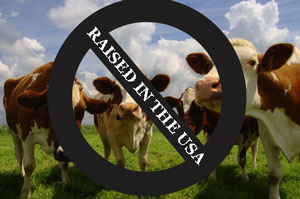 ships out. Chad says that without massive awareness and sweeping change, egg production in California will be all but eliminated by 2015, and that thanks to recent ballot initiatives, the process has already begun. He points to the confusion around the “free-range” issue, and the power of groups like The Humane Society, who have taken their agenda to a whole new level. According to Chad, one of their intended goals is now the elimination of all US animal-based agriculture.
ships out. Chad says that without massive awareness and sweeping change, egg production in California will be all but eliminated by 2015, and that thanks to recent ballot initiatives, the process has already begun. He points to the confusion around the “free-range” issue, and the power of groups like The Humane Society, who have taken their agenda to a whole new level. According to Chad, one of their intended goals is now the elimination of all US animal-based agriculture.
Activistcash
Chad wasn’t alone. Walking around Indianapolis I had dozens of similar encounters with a variety of people, all deeply concerned about the future of food production in this country, and frustrated that the relevant issues have been framed by well-funded political organizations with very specific agendas. I listened to stories from agri-scientists about environmental groups fiercely opposed to biotechnical and chemical breakthroughs that would dramatically increase food production worldwide. I saw literature from PETA that likened beef production to “genocide.” And a young farmer named Travis told me about a $1,200 fine levied by OSHA, because the bottom rung on one of his ladders was bent.
As I spoke with various farmers that evening, I realized that I had asked the wrong question. “Why?” is too easy. Obviously, today’s farmers need a PR Campaign because they are beset by an army of angry acronyms, each determined to change modern agriculture in a way that better reflects their particular worldview. The better question is “How.” How is it that 300 million Americans – all addicted to eating – have become disconnected from the people who grow our food? What new priorities have captured our shared concern?
The answer depends entirely upon whom you ask. PETA has one response; The Sierra Club has another. The Humane Society might see it differently than The EPA, and Greenpeace has a different reply than OSHA. Fair enough; it’s a free country. But how did these organizations get so much power? Are their arguments really that compelling? Are their leaders really that charismatic? Are their members really that enlightened? Or has our prosperity created a toehold for ideas that would have simply died on the vine one or two generations ago?
Imagine The HSUS successfully closing down California egg production back in …1960. Or in the same year, imagine OSHA fining a family farm $1,200 for a bent ladder. Imagine telling hungry Americans decades ago that environmental policy would make it impossible to maximize food production. I’m not looking for a fight – really, I’m not. I understand that different things are important to different people, and I don’t begrudge anyone’s right to champion the issues that matter most to them. But what’s more important than eating? What’s more important than feeding a hungry planet, and supporting the people who grow our food?
On Dirty Jobs, I’m no expert, and I’m even less of one here. But I have a theory, and it goes like this – all jobs rely on one of two industries – mining and agriculture. Every tangible thing our society needs is either pulled from the ground, or grown from the ground. Without these fundamental industries there would be no jobs of any kind. There would be no economy . Civilization begins with miners and farmers, and polite society is only possible when skilled workers transform those raw materials into something useful or edible.
. Civilization begins with miners and farmers, and polite society is only possible when skilled workers transform those raw materials into something useful or edible.
I started mikeroweWORKS.com, because I think we’ve become disconnected from that basic premise. I think we’ve simply forgotten about the underlying industries upon which all else depends, and as a result, created for ourselves a vocational identity crisis. Our collective definition of a “good job” has evolved into something that no longer resembles Work, and that has detached us from a great many things, including our food, and the people who provide it.
Could this be the root cause of the FFA’s “perception problem?” Could our warped view of the modern farmer be just another symptom of our warped relationship with work in general? It’s just a theory, but how else can we explain a country that marginalizes and stereotypes the very people we depend on most? From what I’ve seen, most people like farmers. Most people like food. The problem is Work. We’ve spent decades trying to distance ourselves from traditional notions of Work. And who embodies Work more than The American Farmer?
If Chad’s right, U.S. animal agriculture is under siege, and we’re well on our way to getting our eggs from China and our beef from Brazil. Perhaps this would please The Humane Society. Perhaps PETA would like to see those items removed from menu’s altogether, and that’s fine. People often disagree about important matters, but without context, the bigger issue gets lost. This is our food supply we’re talking about – not the size of a chicken’s cage, or the resistance to chemically enhanced soil. We already rely on the world for our energy. Do we really want to rely on them for our food as well?
I auditioned the other day for the voiceover on a TV commercial about the American Farmer. (Yeah, I still audition.) I don’t recall the whole thing, but it started out like this – “Every year we demand more and more from our farmers. More food from less land. More food from less energy. More food from less labor. And every year our farmers deliver.”
I believe that to be a true statement. I also believe that as a country, we haven’t made it easy for them. Two percent of our population provides the rest of us with all the food we need, and we behave as though it’s our birthright. Like nothing we do can threaten the abundance. It seems to me that as a country, we could do a better job of supporting the people who feed us. And we could start by acknowledging the incredible challenges facing The American Farmer.
But I digress.
All I really wanted to do was congratulate The FFA for their good work, and thank them for inviting me back to Indianapolis. I spend a lot of time these days talking about the importance of getting dirty – mostly with white-collar workers who don’t really know what I’m getting at, which is fine. Preaching to the choir doesn’t do much but bore the choir, so I rarely take the opportunity to talk to groups who already “get it.”
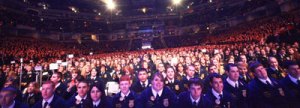 However, there is something to be said for occasionally finding yourself in the company of like-minded people. And every so often, if you can get your thoughts organized in time, it’s fun to address the rafters and deliver a message that gets 50,000 enthusiastic future farmers to stand up and holler back with unbridled gusto.
However, there is something to be said for occasionally finding yourself in the company of like-minded people. And every so often, if you can get your thoughts organized in time, it’s fun to address the rafters and deliver a message that gets 50,000 enthusiastic future farmers to stand up and holler back with unbridled gusto.
Such were my last three days in Indianapolis. Good for the spirit, good for the ego, and far superior to crawling down a flaming chimney.
Not that there’s anything wrong with that…
– Mike
Mike Rowe is passionate and leading by example, we need to be proud to be loud about sustaining FFA, Ag Education and agriculture. We are the grass-roots advocacy effort and we can make a big difference. Thank you FFA Alumni for all you do!
 “I believe that the life of service is the life that counts; that happiness endures to mankind when it comes from having helped lift the burdens of others.”
“I believe that the life of service is the life that counts; that happiness endures to mankind when it comes from having helped lift the burdens of others.” i affiliate, and our state FFA Alumni does not quite have the membership numbers it once did. Needless to say, my experience with Alumni has been limited. I came into the conference with the idea that alumni support of FFA only came in the form of finances. I could not have been more misled. The FFA Alumni Development Conference opened my eyes to the service side of the Alumni.
i affiliate, and our state FFA Alumni does not quite have the membership numbers it once did. Needless to say, my experience with Alumni has been limited. I came into the conference with the idea that alumni support of FFA only came in the form of finances. I could not have been more misled. The FFA Alumni Development Conference opened my eyes to the service side of the Alumni.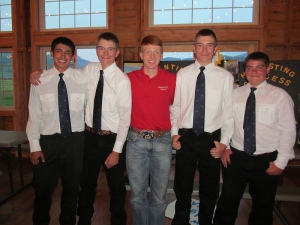 than that which occurred the Friday evening of the conference. We were treated to a special presentation by the Twin Bridges FFA Chapter during which they shared that they had lost their chapter charter 25 years earlier. For the past year, students have been taking online agriculture classes in the hope of rejuvenating their agricultural education program. During their presentation they shared how FFA was influencing their life. Their sponsor then explained that the chapter was working to earn their FFA jackets. As they concluded their presentation, Bob Barton began passing around a hat and contributions were made. In the 5 minutes it took to pass that that hat around, the Alumni collected around $1200 to give to the Twin Bridges FFA Chapters for their jackets. What better act of service than to help lift the burdens of others?
than that which occurred the Friday evening of the conference. We were treated to a special presentation by the Twin Bridges FFA Chapter during which they shared that they had lost their chapter charter 25 years earlier. For the past year, students have been taking online agriculture classes in the hope of rejuvenating their agricultural education program. During their presentation they shared how FFA was influencing their life. Their sponsor then explained that the chapter was working to earn their FFA jackets. As they concluded their presentation, Bob Barton began passing around a hat and contributions were made. In the 5 minutes it took to pass that that hat around, the Alumni collected around $1200 to give to the Twin Bridges FFA Chapters for their jackets. What better act of service than to help lift the burdens of others?
